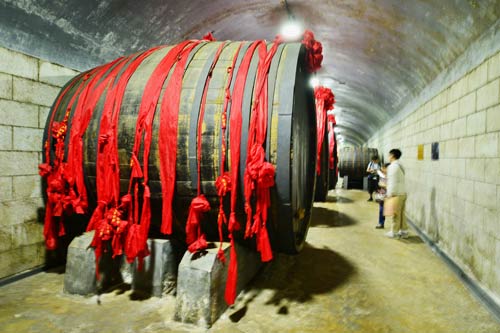|
 |
|
Yantai is China's winemaking center.[Photo provided to Chinadaily.com.cn] |
Nestled between the blue waters of Bohai Bay and the sprawling mountain ranges along Shandong province’s northern coast, Yantai is China’s winemaking center. The city is home to Changyu Pioneer Wine Co, China’s first industrialized wine manufacturer, which was established in 1892. In 1987 Yantai was the first Asian city to be recognized as an International Vine and Wine City by the International Organization of Vine and Wine.
“Yantai aims to become a world trade center and production base for premium wines,” said Meng Fanli, mayor of Yantai.
The city has a complete industrial chain that encompasses grape growing, wine making, wine trade and wine-themed tourism, said Yi Fenghuang, head of the Yantai Grape and Wine Bureau.
Statistics from the bureau showed Yantai has 34,600 hectares of land dedicated to planting grapes for wine. The land produced 330,000 liters of wine last year, which accounted for 28 percent of China’s total wine output.
There are 152 wine-making companies in Yantai, creating combined revenue of 21.8 billion yuan in 2013.
“The output of wine only accounts for 28 percent but the revenue generated from the wine industry shares 53 percent of the total revenue generated from China’s wine industry,” said Yi.
In addition to domestic wine makers, overseas wine heavyweights have built facilities in Yantai to capitalize on the city’s growing conditions for wine grapes.
In 2012, Domaines Barons de Rothschild, Chateau Lafite’s parent company, teamed up with CITIC East China Corp Ltd, China’s largest State-owned investment company, to build a chateau in Yantai.
When the vineyard around the chateau is completed, it will reach 50 hectares in 2016.
To boost the wine industry, Yantai government is developing chateau clusters and to date there are 50 under construction.
China Great Wall Wine Co Ltd, Dynasty Fine Wines Group Ltd and alcoholic drinks maker Kweichow Moutai Co are also building wine chateaus in the city.
A 6 billion yuan wine city is also under construction and will include two wine and brandy chateaus, a research institute, a wine production center, a vineyard, a European-style village and an international wine trading center.
The local government has allocated 10 million yuan a year to develop grape growing areas and build wine brands.
As part of these efforts an international wine exposition is held every year. The event attracts more than 200 exhibitors from top wine producing countries, including Australia, South Africa and Chile, who showcase their wines to more than 10,000 visitors.
The event is seen as an important platform in China to promote wine trade and communication on wine-making technology.
Yantai’s wine culture and European style chateaus have also become tourism resources. Every year, more than one million tourists flock to the city to visit Changyu’s century-old cellar, wine museum and Chateau Changyu-Castel.
The local government is building a wine square, a shopping street and an exhibition center to further boost the tourism industry. |